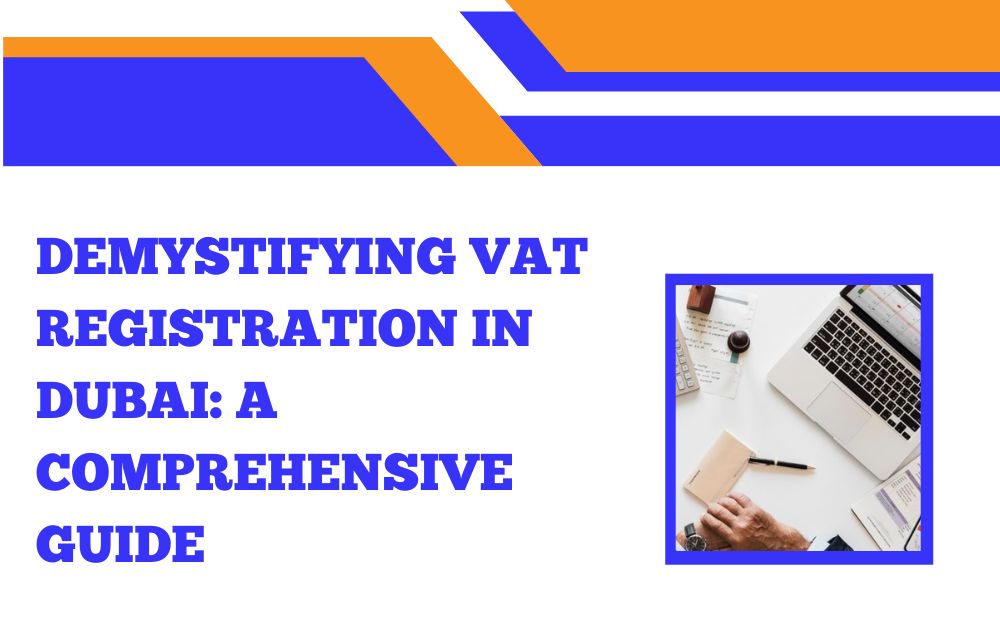Demystifying VAT Registration in Dubai: A Comprehensive Guide

Introduction
In recent years, the United Arab Emirates (UAE) has undergone significant economic transformation, with the introduction of Value Added Tax (VAT) being a notable development. For businesses operating in Dubai, understanding the ins and outs of VAT registration is crucial for compliance and financial management. In this guide, we’ll break down everything you need to know about VAT Registration in Dubai, from its basics to the step-by-step process.
What is VAT?
Value Added Tax (VAT) is a consumption tax imposed on the value added to goods and services at each stage of production or distribution. It is an indirect tax that is ultimately borne by the end consumer. VAT is levied at a standard rate of 5% in the UAE, including Dubai, on most goods and services, with some exceptions for essential items and certain sectors.
Who Needs to Register for VAT in Dubai?
VAT registration is mandatory for businesses that meet specific criteria set by the Federal Tax Authority (FTA) in the UAE. Generally, a business must register for VAT if its taxable supplies and imports exceed the mandatory registration threshold within a 12-month period. As of 2024, the mandatory registration threshold stands at AED 375,000.
Benefits of VAT Registration
While VAT registration may seem like an additional administrative burden for businesses, it also comes with several benefits:
- Compliance: VAT registration ensures that your business complies with the tax laws of the UAE, avoiding potential penalties and legal consequences for non-compliance.
- Input Tax Recovery: Registered businesses can claim input tax credits on VAT paid on their purchases and expenses, thereby reducing the overall VAT liability.
- Credibility: VAT registration enhances the credibility and reputation of your business, as it demonstrates your commitment to transparency and financial responsibility.
- Market Access: VAT registration may be a requirement for participating in government tenders or securing contracts with larger corporations, expanding your business opportunities.

Step-by-Step Guide to VAT Registration in Dubai
Now, let’s walk through the process of VAT registration in Dubai:
Step 1: Determine Eligibility
Before proceeding with VAT registration, assess whether your business meets the criteria for mandatory registration based on its taxable supplies and imports over the past 12 months.
Step 2: Gather Required Documents
Prepare the necessary documentation for VAT registration, including:
- Trade license and business registration documents
- Emirates ID and passport copies of business owners/partners
- Details of business activities and anticipated turnover
- Bank account information
- Financial records and tax-related documents
Step 3: Access the FTA Portal
Visit the Federal Tax Authority (FTA) online portal and create an account to initiate the VAT registration process. You will need to provide basic information about your business and submit the required documents electronically.
Step 4: Complete the Registration Form
Fill out the VAT registration form accurately, providing details such as business name, contact information, tax group registration (if applicable), and other relevant information as per the FTA’s requirements.
Step 5: Submit the Application
Review the information entered in the registration form for accuracy and completeness before submitting it online through the FTA portal. Upon successful submission, you will receive a confirmation email acknowledging receipt of your application.
Step 6: Await Approval
The FTA will review your VAT registration application and may request additional information or clarification if needed. Once the application is processed and approved, you will receive a VAT registration certificate confirming your registration status.
Step 7: Commence VAT Compliance
Upon receiving the VAT registration certificate, your business is officially registered for VAT in Dubai. You must start charging VAT on taxable supplies, issue VAT-compliant invoices, maintain proper records, and file periodic VAT returns as per the FTA’s requirements.
Conclusion
Navigating the process of VAT registration in Dubai may seem daunting at first, but with the right knowledge and guidance, businesses can ensure compliance and leverage the benefits of VAT registration. By understanding the basics of VAT, determining eligibility, and following the step-by-step registration process outlined above, businesses can seamlessly integrate VAT into their operations and contribute to the growth and development of the UAE economy. Remember, VAT compliance is not just a legal obligation but also an opportunity to enhance the financial health and reputation of your business in Dubai’s competitive marketplace.
Note :- If you’re seeking information on VAT registration in Dubai, you can discover more on the Googlenewswebsite, where you’ll find a plethora of resources and articles to guide you through the process.





